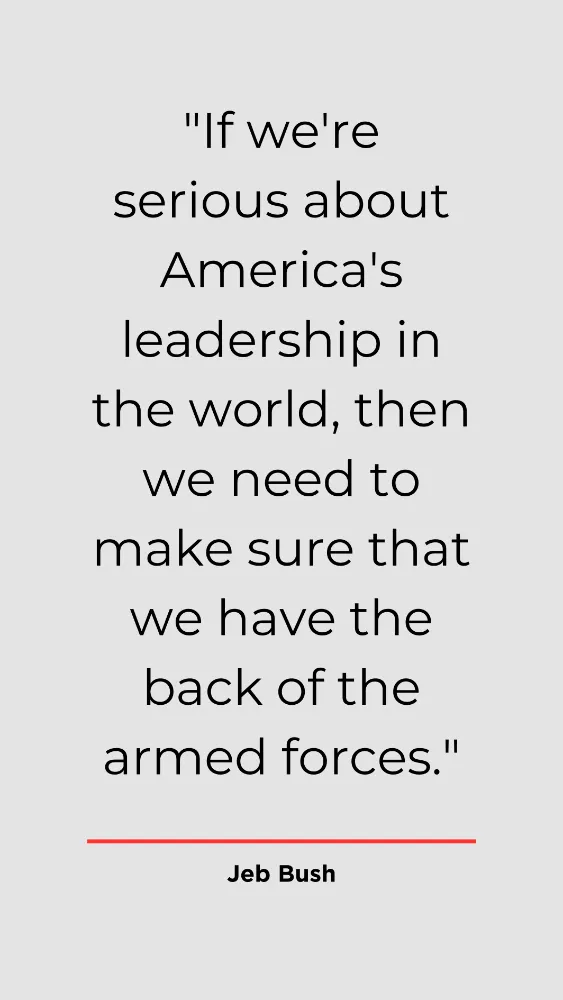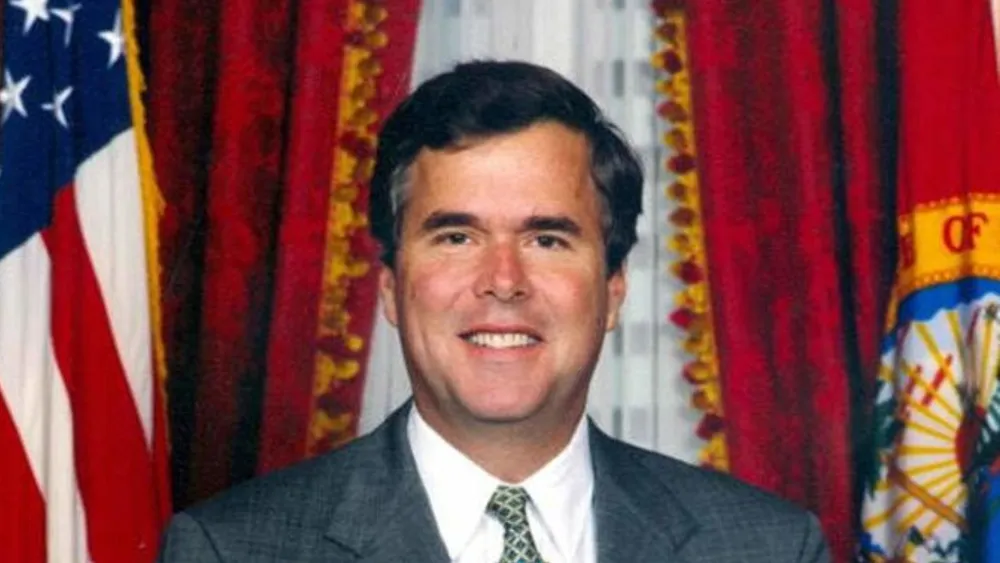Jeb Bush is an American politician and businessman. He served as Florida’s 43rd governor from 1999 to 2007 and, in the 2016 Republican primaries, aimed for the U.S. presidency but faced defeat.
Born into the Bush political family, Jeb is the second son of former President George H. W. Bush and former First Lady Barbara Bush. He pursued Latin American affairs at the University of Texas after graduating from Phillips Academy.
In Florida, Bush initially lost the 1994 gubernatorial race but won in 1998, becoming the state’s first two-term Republican governor.
His tenure saw a focus on Everglades conservation, healthcare reform, and education improvements.
Early Years in Houston and the Journey to Andover
Jeb born on February 11, 1953, in Midland, Texas, underwent a transformative journey. Moving to the Tanglewood neighborhood at six, Jeb’s nickname “Jeb” derived from his initials J.E.B. (John Ellis Bush).
Growing up with siblings Neil, Marvin, Dorothy, George, and his late sister Robin, his educational path began at Grady Elementary in Houston before he transferred to Phillips Academy in Andover, Massachusetts, at the age of 14.
Despite facing academic challenges in his early high school years, Jeb’s perseverance and commitment to improvement were evident. He faced a potential expulsion due to poor grades at Phillips Academy but managed to turn things around, eventually making the honor roll and becoming the captain of the tennis team by the end of his senior year.
Jeb Bush: A Phase of Exploration and Transformation
Jeb’s diverse experiences during high school included the recreational use of marijuana, hashish, and cigarettes, reflecting a commonality with many of his peers during that era. However, his journey was characterized by growth and learning, as he emerged from this phase to graduate with honors.
At 17, Jeb participated in Andover’s student exchange summer program, teaching English as a second language and contributing to the construction of a school in Ibarrilla, Mexico. It was here that he met Columba Garnica Gallo, who would later become his wife.
Jeb Bush: Draft Registration and College Choice
Jeb’s entry into adulthood included registering for the draft after graduating from high school in 1971. However, he did not get drafted, as the U.S. shifted to an all-volunteer military starting in 1973.
Choosing the University of Texas at Austin over Yale University, a path commonly taken by his family members, Jeb Bush demonstrated independence in his educational choices. At the university, he showcased his athletic prowess by playing on the Texas Longhorns varsity tennis team in 1973.
From Banking to Real Estate and Advocacy
In 1974, Jeb Bush commenced his professional journey in the international division of Texas Commerce Bank, founded by James Baker’s family. Sent to Caracas in 1977, he managed the bank’s new operation.
After the 1980 presidential election, the Bush family relocated to Miami-Dade County. Jeb delved into real estate alongside Cuban immigrant Armando Codina, quickly transforming their partnership into a leading South Florida real estate development firm.
Moreover, Bush also worked as a lobbyist, notably for Miguel Recarey’s health maintenance organization, IMC, linked to a significant Medicare fraud case.
Jeb Bush: Commitment to Cuban Exiles and Lobbying Efforts
Jeb Bush devoted his time as an unpaid volunteer, passionately supporting his father’s presidential aspirations. His political journey in Florida commenced in the mid-1980s when he assumed the role of Chairman of the Dade County Republican Party. He played an important role in Bob Martinez’s successful bid for governor in 1986.
Appointed as Florida’s Secretary of Commerce by Martinez, Jeb served from 1987 to 1988 before dedicating himself to his father’s presidential campaign. Advocating for Cuban exiles, lobbying for the release of Orlando Bosch, and managing Ileana Ros-Lehtinen’s campaign marked his early political engagements.
Education Reforms and Controversies
During Bush’s tenure, education took center stage as his administration advocated for public education reform through the “A+ Plan.” This initiative set higher standards, mandated testing for all students, and graded Florida schools.
Notably, from 1998 to 2005, 4th-grade reading scores in Florida surged by 11 points, surpassing the national average.
Bush supported school vouchers and charter schools, launching programs like the McKay Scholarship for students with learning disabilities and the A+ Opportunity Scholarship, which, unfortunately, faced legal challenges.
Additionally, he introduced the Corporate Income Tax Credit Scholarship, offering corporations tax credits for supporting scholarships for low-income students.
Despite his refusal to increase taxes, Bush opposed a ballot initiative to cap class sizes, jokingly revealing “devious plans.” In higher education, his approval of three new medical schools and the “One Florida” proposal, ending affirmative action in state university admissions, drew both praise and criticism.
The University of Florida faculty denied Bush an honorary degree, while the Alumni Association named him an honorary alumnus.
The Ethical Dilemma and Legal Battles
Governor Bush led significant reforms to Florida’s medical liability system, facing opposition from the Republican-dominated Senate.
He pushed for caps on non-economic damages, resulting in five special sessions and a contentious debate.
Though the legislature eventually agreed, a 2014 Florida Supreme Court ruling deemed the damage cap unconstitutional. Bush also reformed Medicaid, moving recipients into private managed care systems.
In the Terri Schiavo case, he signed “Terri’s Law” to keep Schiavo on life support, facing legal challenges. Bush opposed abortion, supporting parental notification laws and championing pro-life initiatives.
Additionally, he addressed environmental concerns, signed Everglades restoration legislation, and enacted controversial policies on civil service protection, racial preferences, and gun owner protection.
Jeb Bush: Navigating International Challenges
In international relations and security, Jeb Bush expressed support for the 2003 Iraq invasion, stating he would have authorized it but later admitted it was a mistake given subsequent knowledge.
He opposes a major U.S. troop commitment against ISIS, favoring an increased military presence in Iraq’s al-Anbar province. Bush supports the NSA’s metadata collection and the USA Patriot Act, emphasizing their role in national security.
Furthermore, he advocates for higher military spending, deems the Iran nuclear deal a “horrific deal,” and condemned the final agreement, though he wouldn’t immediately revoke it as president. Bush endorsed Trump’s decision to recognize Jerusalem as Israel’s capital, applauding it as a show of solidarity.

Beyond Politics: Jeb Bush’s Personal Chapter
In 1970, while teaching English in Mexico as part of a foreign exchange program, Jeb Bush met Columba Garnica Gallo. They got married on February 23, 1974, in Austin, Texas. Currently, the family resides in Coral Gables, Florida, with their three children: George Prescott, Noelle Lucila, and Jeb Bush Jr.
Furthermore, Jeb changed his religion to Roman Catholicism in 1995. Soon, he became a Fourth Degree Knight of Columbus.
Resilience and Growth: Lessons from Jeb Bush’s Journey
Jeb Bush’s life teaches the moral lesson of resilience and growth. Despite early academic challenges, he transformed setbacks into success through perseverance. His commitment to improvement, diverse experiences, and dedication to public service underscore the importance of resilience and continuous personal development.












Great post. I uѕed to be checking constantly this blog and I’m inspired!
Extremelу helpful info 🙂 Thanks and beѕt of luck.